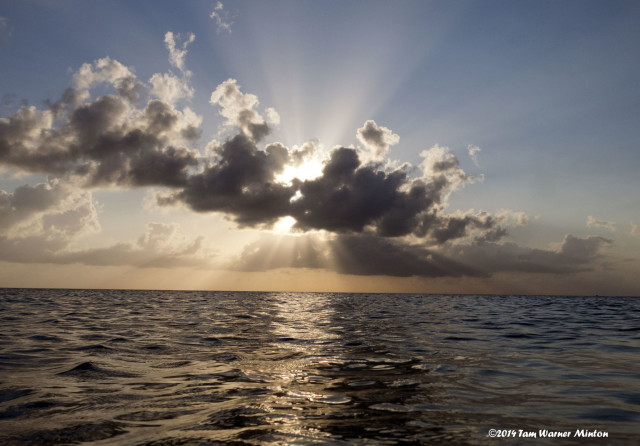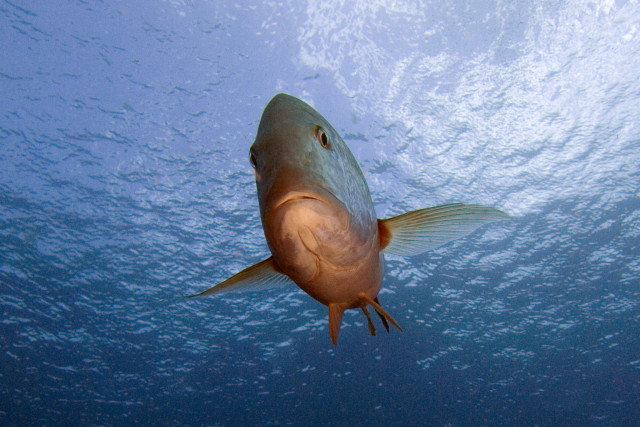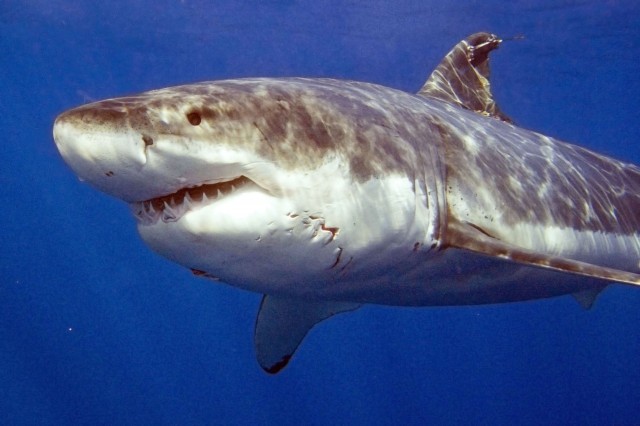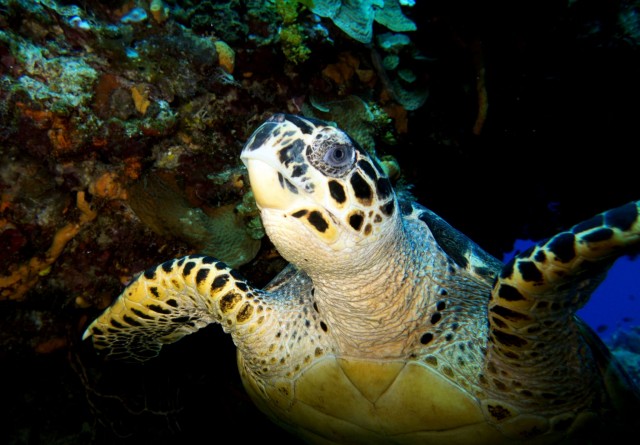Marine Life & Conservation
Our Oceans Are In Critical Danger… Can You Really Make A Difference?

Yes. You can. Each and every one of us can make a difference. How? By making small, but important, choices. Here are some easy examples of how you can start to make a difference:
- Only eat sustainable and responsibly fished seafood. How do you know what is okay to eat? Go to Seafood Watch, the app updated regularly by the Monterey Bay Aquarium and when you go out to eat… check to see which seafood on the menu is sustainable. The lists are separated by area of the country (or world), and given a Green, Yellow, or Red light. Red means the fish is critically overfished. Ever wonder why Red Snapper is hard to find these days? They’ve been overfished, and their populations have critically declined. You can read about it here, at NOAA Fishwatch.
In some areas of the world it is okay to eat Snapper…fresh, line caught snapper….but in others, the populations are not sustainably fished. By using the Seafood Watch app, you can check which fish are okay to eat, and which ones to avoid. Here is the worst cop out of all: well, it’s already dead so I might as well order it. It is the demand for it that drives over-fishing. When people realize that in order to eat Red Snapper in the future they must not order it now… give our fisheries time to recover. Until then, if it is on the Red List, don’t eat or order it!
- Do not eat at restaurants that serve endangered animals. Do not eat at restaurants serving shark. Any kind of shark. Why? Sharks are endangered. If we lose our sharks, our oceans will collapse. That seems pretty dramatic, right? But it is true. Sharks have been around for 450 million years. They are the apex predator (except for humans) in the ocean. They keep marine populations in balance. Sharks tend to eat the older, sicker, slower members of a population, which keeps that population healthier. They keep populations in check, which protects other food sources in the ocean like grasses, plants, corals, mollusks, etc. The foodweb is a constant balancing act, and sharks are a keystone species, meaning that they must be in the ecosystem or that ecosystem will collapse. Sharks kill around 5 people a year. Humans slaughter 75 to 100 million sharks a year, mostly for their fins. For that matter, do not eat turtle, turtle soup, turtle eggs, etc. They are critically endangered!
- When you travel, fly airlines that do not carry endangered species cargo. American Airlines just announced it will no longer carry shark fins as cargo! They join, just to name a few, Air New Zealand, Air Pacific, Cathay Pacific, Singapore Airlines, Jet Airways, and United Airlines. Many, many carriers are joining the crusade to stop transporting ivory, rhino horns, shark fins, manta fins, sea turtles and other endangered species parts. Choose your airline based on this kind of criteria. If they contribute to the shark fin trade, do not fly them. And let them know why you won’t fly them. Use social media to chastise any transport of these endangered species parts.
- When it comes to trading in endangered species, we know the major consumer is China. Other Asian countries are also consumers, but the heart and soul of the shark fin trade is in Hong Kong. The nation of China has stopped serving Shark Fin Soup at state functions… a huge leap forward! Hong Kong has recently followed suit. 95% of shark fins are consumed by Asian countries and go through Hong Kong. The trade is beginning to decline, but we have to keep up the pressure. Shangri-La Hotels and the Peninsula Hotel Group just announced they will no longer serve shark fin soup, bird’s nest, or black moss – all endangered. If you are traveling to Asia, ask the hotel if they sell shark fin soup, any ivory products, or anything with rhino horns. If they do, make the decision not to stay there, and let them know why.
- Don’t buy Chinese medicines with rhino horn, shark liver, or any other endangered species ingredient. Believe me, no scientific study has ever shown that these ingredients cure disease or serve as an aphrodisiac. If there is no demand, the trade will collapse.
Do you know the extent that humans depend upon the ocean to live? The Nature Conservancy points out that the ocean absorbs 1/3 of human produced carbon-dioxide and supplies us with oxygen. Kelp, a plant from the ocean, is used to make salad dressing, dairy products, shampoos and medicines. Compounds from the coral reefs, plants and animals, help treat numerous diseases. Oceans produce 70% more goods and services into our economies and GDPs than land products. Each and every one of us needs the ocean healthy in order to survive. We all have a responsibility.
Rob Stewart, producer of the film Sharkwater, and Revolution, said this recently on his Facebook page: “By 2050, we will live in a world with no reefs, no rainforests, no fish, and 9 billion hungry people.” You might not be here, but if you have children, they will. It is horrifying to think about how catastrophic living in that world would be. There are only a finite amount of resources, and we cannot keep allowing our population to grow without serious consequences to the quality of human life.
Start small, but start soon! If we all make small, good decisions, we can make a big difference. We must all begin now… life depends on it.
For more from Tam, visit www.travelswithtam.com.
Blogs
The Ocean Cleanup Breaks 10,000,000 KG Barrier

The Ocean Cleanup, the global non-profit project, has removed a verified all-time total of ten million kilograms (22 million lbs.) of trash from oceans and rivers around the world – approximately the same weight as the Eiffel Tower.
To complete its mission of ridding the oceans of plastic, The Ocean Cleanup uses a dual strategy: cleaning up the Great Pacific Garbage Patch (GPGP) to remove the plastic already afloat in the oceans, while stopping the flow of plastic from the world’s most polluting rivers.
Through cleaning operations in the GPGP and in rivers in eight countries, the cumulative total of trash removed has now surpassed ten million kilograms. This milestone demonstrates the acceleration of The Ocean Cleanup’s impact, while underlining the astonishing scale of the plastic pollution problem and the need for continued support and action.
While encouraging for the mission, this milestone is only a staging point: millions more tons of plastic still pollute our oceans and The Ocean Cleanup intends to continue learning, improving and innovating to solve this global catastrophe.
This announcement comes as governments from around the world meet to continue negotiations to develop a new legally binding instrument to end plastic pollution at INC4 in Ottawa, Canada. Representatives of The Ocean Cleanup will be in attendance and the organization will be urging decision-makers to collaborate towards a comprehensive and ambitious global treaty which addresses plastic at all stages of its life cycle and in all marine environments worldwide, including in areas beyond national jurisdiction.
It is encouraging to see that the need for remediation is reflected in the various options for potential treaty provisions. It is essential that the final treaty contains clear targets for the remediation of legacy plastic pollution, and reduction of riverine plastic emissions.
Tackling plastic pollution requires innovative and impactful solutions. The treaty should therefore incentivize the innovation ecosystem by fostering innovations that make maximal use of data, technology and scientific knowledge – such as those designed and deployed by The Ocean Cleanup.
‘After many tough years of trial and error, it’s amazing to see our work is starting to pay off – and I am proud of the team who has brought us to this point.’ said Boyan Slat, Founder and CEO of The Ocean Cleanup. ‘While we still have a long way to go, our recent successes fill us with renewed confidence that the oceans can be cleaned.’
The Ocean Cleanup was founded in 2013 and captured its first plastic in 2019, with the first confirmed catch in the GPGP coming soon after the deployment of Interceptor 001 in Jakarta, Indonesia. After surpassing one million kilograms of trash removed in early 2022, the non-profit project has since progressed to the third iteration of its GPGP cleaning solution, known as System 03, and a network of Interceptors currently covering rivers in eight countries, with more deployments set for 2024.
About The Ocean Cleanup
The Ocean Cleanup is an international non-profit organization that develops and scales technologies to rid the world’s oceans of plastic. They aim to achieve this goal through a dual strategy: stemming the inflow via rivers and cleaning up the legacy plastic that has already accumulated in the ocean. For the latter, The Ocean Cleanup develops large-scale systems to efficiently concentrate the plastic for periodic removal. This plastic is tracked and traced through DNV’s chain of custody model to certify claims of origin when recycling it into new products. To curb the tide via rivers, The Ocean Cleanup has developed Interceptor™ solutions to halt and extract riverine plastic before it reaches the ocean. Founded in 2013 by Boyan Slat, The Ocean Cleanup now employs a broadly multi-disciplined team of approximately 140. The foundation is headquartered in Rotterdam, the Netherlands.
For more information, visit: theoceancleanup.com and follow @theoceancleanup on social media.
Marine Life & Conservation
Steve Backshall to headline Shark Trust’s flagship event: For the Love of Sharks

Join a host of amazing, shark loving, speakers including Steve Backshall and the Shark Trust team for an evening celebrating shark conservation at the Royal Geographical Society in London this November.
Date: 29th November 2024
Time: 6-10pm
Location: Royal Geographical Society, London
Tickets: https://www.sharktrust.org/Event/flos24
The event will be a celebration of all things shark. Those lucky enough to get hold of tickets will hear from engaging guest speakers with a passion for sharks.
The line-up includes (*subject to change if unforeseen circumstances arise)
Steve Backshall: One of television’s busiest presenters, BAFTA award-winning wildlife expert Steve has been passionate about the wild world ever since he was young.
Steve’s impressive TV career has taken him all around the world, investigating a wide array of species and environments. Steve has filmed over 100 hours of children’s wildlife programmes with the BAFTA award winning Deadly 60 franchise and recently, with Sky Nature, for his new series ‘Whale with Steve Backshall’. He has been a patron for the Shark Trust for 10 years.
Simon Rogerson: is a photojournalist specialising in natural history, diving and the sea.
He is editor of SCUBA magazine, the official journal of the British Sub-Aqua Club. Simon started his career as a crime reporter but gravitated towards his ‘less depressing’ interest in underwater exploration, joining the staff of DIVE magazine in 1999. In 2005 he was named ‘Editor of the Year’ in the PPA’s Independent Publishing Awards. Simon also works as a freelance writer, contributing frequently to the Sunday Times and Telegraph, in addition to BBC Wildlife, Esquire, and a host of international diving magazines. He is the author of a book, Dive Red Sea, published by Ultimate Sports. Now based in Berkshire, Simon has been a Patron of the Shark Trust for 20 years.
More speakers to be announced soon. Head to the Shark Trust website to learn more.
The evening will also allow guests the final chance to see the Oceanic 31, shark art exhibition. Some of the artwork will be auctioned/raffled at the event, while the rest will be auctioned online to raise money for the Shark Trust Oceanic Programme.
For the Love of Sharks is an evening with something for everyone who is interested and fascinated by sharks. Join the Shark Trust, their Patrons, Trustees and Staff, along with a host of supporters for this celebration of shark conservation.
For more information or to buy a ticket: https://www.sharktrust.org/Event/flos24
-

 News3 months ago
News3 months agoCapturing Critters in Lembeh Underwater Photography Workshop 2024: Event Roundup
-

 Marine Life & Conservation Blogs3 months ago
Marine Life & Conservation Blogs3 months agoCreature Feature: Swell Sharks
-

 Blogs2 months ago
Blogs2 months agoMurex Resorts: Passport to Paradise!
-

 Gear Reviews3 weeks ago
Gear Reviews3 weeks agoGEAR REVIEW – Revolutionising Diving Comfort: The Sharkskin T2 Chillproof Suit
-

 Blogs2 months ago
Blogs2 months agoDiver Discovering Whale Skeletons Beneath Ice Judged World’s Best Underwater Photograph
-

 Gear Reviews3 months ago
Gear Reviews3 months agoGear Review: Oceanic+ Dive Housing for iPhone
-

 News2 months ago
News2 months agoPADI Teams Up with Wellness Brand Neuro to Drive Ocean Change and Create a Blue State of Mind
-

 Marine Life & Conservation2 months ago
Marine Life & Conservation2 months agoSave the Manatee Club launches brand new webcams at Silver Springs State Park, Florida








